How Long Is a Football Game? World Cup | Youth & College
Millions of people around the globe cherish football, often called soccer in certain regions. Whether you’re a die-hard fan, a player, or just curious about the game, one common question that arises is, “How long is a football game?” Football match lengths can differ based on the league, format, and unique situations. In this article, we will explore the varying lengths of football games across different leagues and formats, shedding light on the standard durations and the factors that contribute to the differences.
How Long Do Football Games Usually Last?
Let’s start with a general overview of the duration of football games. Typically, a regular football game is divided into two 45-minute halves, totaling 90 minutes of playtime, though this duration serves merely as a starting point. The actual time can be longer due to stoppages, halftime, and potential extra time or penalties in certain situations.
How Long is a World Cup Football Game?
The FIFA World Cup stands out as one of the most esteemed and globally viewed football competitions. During the World Cup, matches follow the standard format of two halves of 45 minutes each, resulting in a 90-minute game. However, at the end of each half, there is an extra period known as “injury time” or “stoppage time” that is added. This extra time makes up for any disruptions that might have happened during the game, such as injuries or substitutions. The referee determines the exact amount of injury time based on their discretion.
During the World Cup knockout stages, if a match is tied at the end of normal time, the teams play extra time, which includes two 15-minute periods, totaling 30 minutes. Should the score still be tied after extra time, a penalty shootout determines the winner.
How Long are Football Games For Youth Leagues?
Youth football leagues often adapt the game duration to suit the age group and ensure a positive experience for young players. Depending on the age category, the game length can vary. For example, in some youth leagues, matches for under-8 and under-10 age groups may consist of four quarters of 10 minutes each, resulting in a 40-minute game. As players progress to older age groups, the game duration gradually increases, following a similar structure or modifications specific to the league’s guidelines.
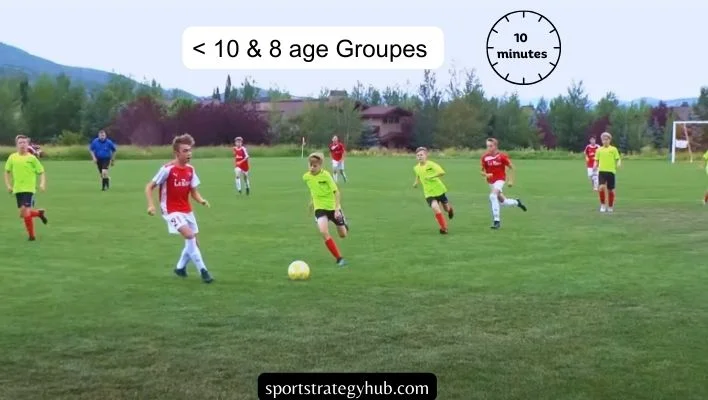
How Long Is A College Football Game?
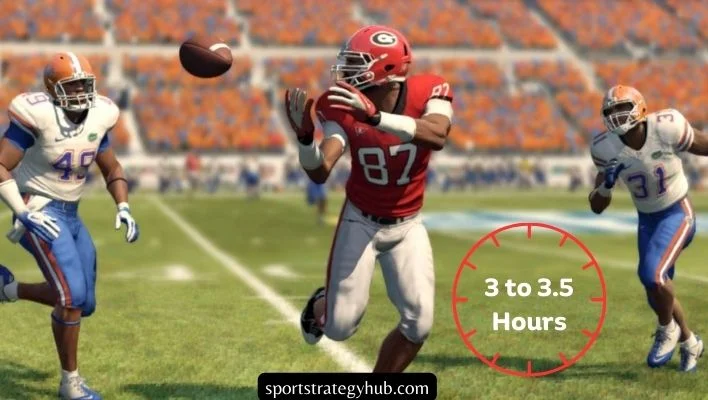
College football games are not as strictly bound by time constraints as professional football matches. Like their professional counterparts, college football games are played in four quarters, with each quarter lasting 15 minutes. However, college football games tend to be longer due to additional breaks and TV timeouts. These timeouts are often taken for commercial breaks or to accommodate television broadcasting schedules. As a result, the average duration of a college football game can range from around 3 to 3.5 hours.
How Long Is An Average NFL Game?
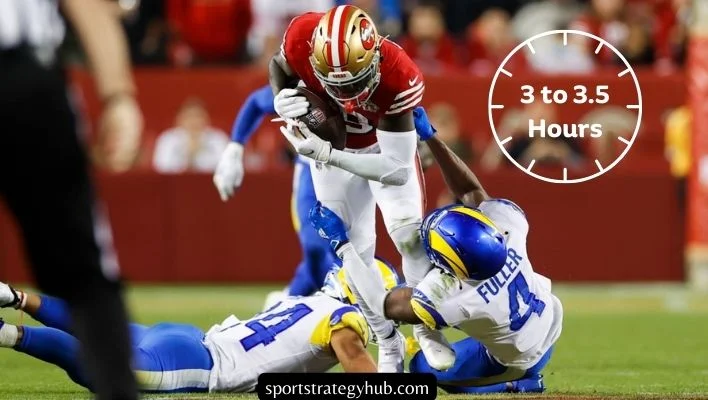
The National Football League (NFL), the top professional football league in the United States, features games that are divided into four quarters, each lasting 15 minutes. However, like college football, NFL games tend to be longer due to factors such as commercial breaks, timeouts, and the nature of the game itself.
In addition to the designated game time, there are also breaks between quarters and a halftime break, which typically lasts around 12 to 15 minutes. As a result, the average duration of an NFL game can range from around 3 to 3.5 hours.
How Long is a Football Match in the UK?
In the United Kingdom, football matches typically follow the standard format of two halves, each lasting 45 minutes, resulting in a 90-minute game. Like other leagues, each half may be extended by an additional period known as injury time or stoppage time. The referee decides the length of this time based on factors like substitutions, injuries, and instances of time-wasting. This additional time is meant to compensate for any time lost during the game.
How Long Is Halftime In Football?
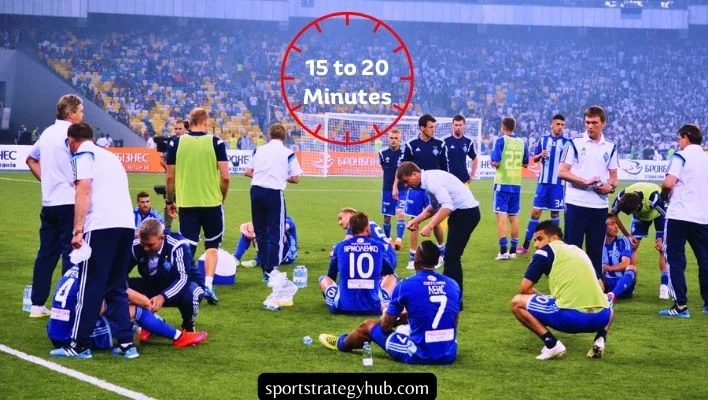
Halftime in football provides players and teams with an opportunity to rest, regroup, and reassess their strategies. Halftime length can differ based on the league and the level of competition. In professional football, including the NFL and major European leagues, halftime typically lasts around 15 minutes. However, in some cases, such as international matches or high-profile tournaments, halftime can be extended to 20 minutes or slightly longer.
How Long is Half-Time in Football? (UK)
In the United Kingdom, halftime in football matches generally lasts for around 15 minutes. During this time, players retreat to the dressing rooms to receive instructions from their coaches, rehydrate, and recharge for the second half of the game. Spectators often use this time to grab refreshments, visit the facilities, or engage in halftime entertainment activities if available.
How Long is Extra Time in Football?
Extra time in football comes into play in certain situations where a winner must be determined. This typically occurs in knockout competitions when a match ends in a draw after regular play. Extra time is divided into two 15-minute periods, totaling 30 minutes. Teams switch ends following the first period. If the score is still tied after extra time, a penalty shootout decides the winner.
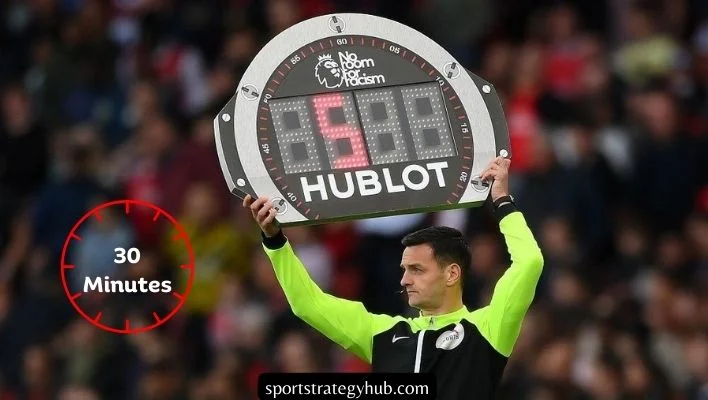
When Do Penalty Shootouts Happen?
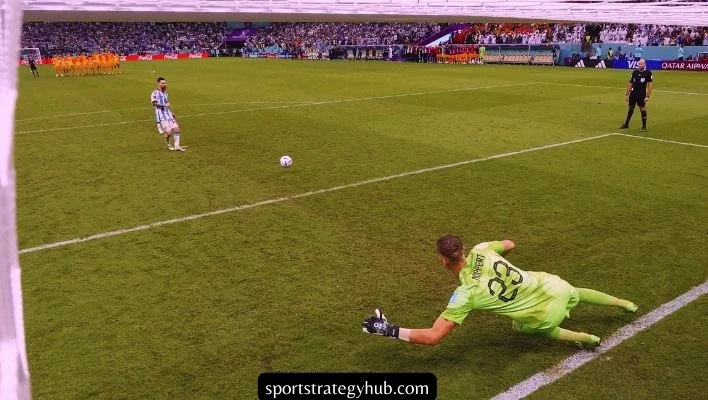
Penalty shootouts resolve a football match when the score is still tied after extra time or in specific knockout tournaments. Teams alternate taking penalty shots from a set mark, and the team that scores the most goals by the end of the shootout is declared the winner. Penalty shootouts can add additional time to the overall duration of a football game. The duration of a penalty shootout can vary depending on factors such as the number of penalties required before a winner is determined.
What Is Fergie Time?
“Fergie Time” is a term coined to describe the perceived additional time added by referees at the end of a football match, specifically during the tenure of Sir Alex Ferguson as the manager of Manchester United. The term gained popularity due to the belief among some fans that referees would add extra time whenever Manchester United needed to score a late goal. While there is no official concept of “Fergie Time,” it has become a part of football folklore and is often used in a light-hearted manner to refer to added time in general.
Can a Professional Football Game Exceed 90 Minutes?
Yes, a professional football game can exceed 90 minutes under certain circumstances. Injury time or stoppage time is added to the end of each half. This is done to compensate for any interruptions or delays that occurred during the match, as mentioned earlier. The exact amount of injury time is at the discretion of the referee and can vary based on factors such as substitutions, injuries, and time-wasting. Additionally, if a football match requires extra time or a penalty shootout to determine a winner, the overall duration of the game will naturally exceed 90 minutes.
Injury Time
Injury time, also referred to as stoppage time or added time, is the extra time added after each half of a football match. This compensates for any stoppages or delays experienced during the game. The referee calculates the duration of injury time considering factors like substitutions, injuries, and instances of time-wasting. During the match, the exact calculation of injury time is not disclosed. However, it is typically displayed on the stadium’s electronic scoreboard. Injury time can range from a few seconds to several minutes, depending on the circumstances.
Fergie Time
“Fergie Time” is a term coined to describe the perceived additional time added by referees at the end of a football match, specifically during the tenure of Sir Alex Ferguson as the manager of Manchester United. The term gained popularity due to the belief among some fans that referees would add extra time whenever Manchester United needed to score a late goal. There is no official concept of “Fergie Time,” yet it has become part of football folklore. It is often used light-heartedly to refer to added time in general.
Extra-Time
Extra time is an additional period played in certain football matches when a winner must be determined. This typically occurs in knockout competitions when a match ends in a draw after regular play. Extra time consists of two periods of 15 minutes each, making a total of 30 minutes. The teams change ends after the first period of extra time. If the score remains level even after extra time, the winner is determined through a penalty shootout.
Penalties
Penalties, commonly referred to as a penalty shootout, decide the winner of a football match if the score is still even after extra time or in some knockout rounds. Each team alternately takes shots from a specified spot, and the team scoring the most goals by the shootout’s conclusion is declared the winner. Penalty shootouts can add additional time to the overall duration of a football game. The duration of a penalty shootout can vary depending on factors such as the number of penalties required before a winner is determined.
What Was the Longest Football Match in History?
Football matches usually adhere to the designated game durations. However, there have been exceptional cases where matches have lasted significantly longer due to various circumstances. One such notable example is the match between AS Adema and SO l’Emyrne in Madagascar in 2002. In a display of protest against perceived biased refereeing in a previous match, SO l’Emyrne scored own goals repeatedly throughout the game. The game stretched on for an astonishing six hours, concluding with AS Adema triumphing with a score of 149-0. Although this match stands out as a highly unusual and singular occurrence, it underscores the inherently unpredictable nature of football.
FAQs
No, the duration of a football game has not always been 90 minutes. The standard 90-minute duration was established in the late 19th century and has remained consistent since then. Before this standardization, there were variations in match lengths, ranging from 60 minutes to 120 minutes. Over time, the 90-minute duration became widely accepted as the standard for football matches.
UK football, commonly referred to as soccer, differs from American football in various ways. The most significant difference is the use of hands. In UK football, players primarily use their feet to play the game. The goalkeeper is the exception, who can use their hands within certain boundaries. American football, on the other hand, emphasizes hand usage and involves complex strategies, protective gear, and specialized positions.
5-a-side football, a popular small-sided version of the game, typically has shorter durations compared to traditional 11-a-side matches. In most cases, a 5-a-side football game lasts for 40 minutes, divided into two halves of 20 minutes each. The shorter duration allows for more dynamic and fast-paced gameplay, making it a popular choice for recreational and amateur players.
The number of commercials in a football game can vary depending on the league, broadcasting agreements, and other factors. In professional matches, such as those in the NFL or major international tournaments, commercial breaks occur during natural stoppages. These breaks often happen after a goal is scored or during halftime. The frequency and duration of commercials can differ from league to league and may also depend on the broadcasting network.
Conclusion
In conclusion, the duration of a football game can vary depending on various factors such as the league, format, and specific circumstances. The standard duration of a football match is 90 minutes. However, injury time, halftime, and potential extra time or penalties can extend the overall duration.Understanding the length of a football game helps fans, players, and enthusiasts appreciate the nuances and dynamics of the sport. So, the next time you’re watching a football game, you’ll have a better understanding of how long it might last.
See Also: How long is a soccer game
